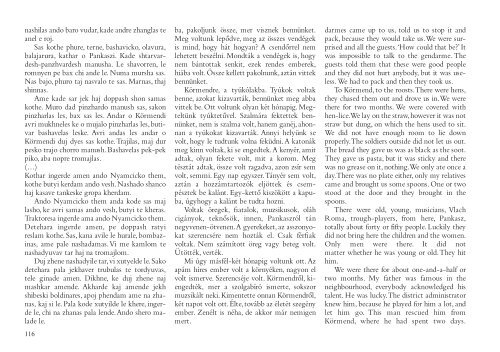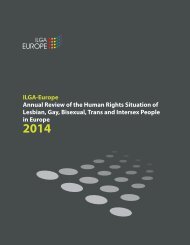Create successful ePaper yourself
Turn your PDF publications into a flip-book with our unique Google optimized e-Paper software.
nashilas ando baro vudar, kade andre zhanglas te<br />
anel e roj.<br />
Sas kothe phure, terne, bashavicko, olavura,<br />
ba la jarura, kathar o Pankaszi. Kade shtarvar -<br />
desh-panzhvardesh manusha. Le shavorren, le<br />
romnyen pe bax chi ande le. Numa mursha sas.<br />
Nas bajo, phuro taj nasvalo te sas. Marnas, thaj<br />
shinnas.<br />
Ame kade sar jek haj doppash shon samas<br />
kothe. Muro dad pinzhardo manush sas, sakon<br />
pinzharlas les, bax sas les. Andar o Körmendi<br />
avri mukhneles ke o mujalo pinzharlas les, bu ti -<br />
var bashavelas leske. Avri andas les andar o<br />
Körmendi duj dyes sas kothe. Trajilas, maj dur<br />
pesko trajo chorro manush. Bashavelas pek-pek<br />
piko, aba nopre tromajlas.<br />
(…)<br />
Kothar ingerde amen ando Nyamcicko them,<br />
kothe butyi kerdam ando vesh. Nashado shanco<br />
haj kasave tankeske gropa kherdam.<br />
Ando Nyamcicko them anda kode sas maj<br />
lasho, ke avri samas ando vesh, butyi te kheras.<br />
Traktoresa ingerde ama ando Nyamcicko them.<br />
Detehara ingerde amen, pe doppash ratyi<br />
reslam kothe. Sas, kana avile le hurale, bombazinas,<br />
ame pale nashadamas. Vi me kamlom te<br />
nashadyuvav tar haj na tromajlom.<br />
Duj zhene nashadyile tar, vi xutyelde le. Sako<br />
detehara pala jekhaver trubulas te tordyuvas,<br />
tele ginade amen. Dikhne, ke duj zhene naj<br />
mashkar amende. Akharde kaj amende jekh<br />
shibeski boldinares, apoj phendam ame na zha -<br />
nas, kaj si le. Pala kode xutyilde le khere, inger -<br />
de le, chi na zhanas pala lende. Ando shero ma -<br />
lade le.<br />
116<br />
ba, pakoljunk össze, mer visznek bennünket.<br />
Meg voltunk lepôdve, meg az összes vendégek<br />
is mind, hogy hát hogyan? A csendôrrel nem<br />
lehetett beszélni. Mondták a vendégek is, hogy<br />
nem bántottak senkit, ezek rendes emberek,<br />
hiába volt. Össze kellett pakolnunk, aztán vittek<br />
bennünket.<br />
Körmendre, a tyúkólakba. Tyúkok voltak<br />
ben ne, azokat kizavarták, bennünket meg abba<br />
vittek be. Ott voltunk olyan két hónapig. Meg -<br />
teltünk tyúktetûvel. Szalmára fektettek bennünket,<br />
nem is szalma volt, hanem ganéj, ahon -<br />
nan a tyúkokat kizavarták. Annyi helyünk se<br />
volt, hogy le tudtunk volna feküdni. A ka tonák<br />
meg kinn voltak, ki se engedtek. A ke nyér, amit<br />
adtak, olyan fekete volt, mit a ko rom. Meg<br />
tésztát adtak, össze volt ragadva, azon zsír sem<br />
volt, semmi. Egy nap egyszer. Tányér sem volt,<br />
aztán a hozzámtartozók eljöttek és csempésztek<br />
be kalánt. Egy-kettô ki szökött a kapuba,<br />
úgyhogy a kalánt be tudta hozni.<br />
Voltak öregek, fiatalok, muzsikusok, oláh<br />
cigá nyok, teknôsök, innen, Pankaszról tán<br />
negyvenen-ötvenen. A gyerekeket, az asszonyo -<br />
kat sze rencsére nem hozták el. Csak férfiak<br />
voltak. Nem számított öreg vagy beteg volt.<br />
Ütötték, verték.<br />
Mi úgy másfél-két hónapig voltunk ott. Az<br />
apám híres ember volt a környéken, nagyon el<br />
volt ismerve. Szerencséje volt. Körmendrôl, ki -<br />
engedték, mer a szolgabíró ismerte, sokszor<br />
muzsikált neki. Kimentette onnan Körmend rôl,<br />
két napot volt ott. Élte, tovább az életét szegény<br />
ember. Zenélt is néha, de akkor már nemigen<br />
mert.<br />
darmes came up to us, told us to stop it and<br />
pack, because they would take us. We were surprised<br />
and all the guests. ‘How could that be?’ It<br />
was impossible to talk to the gendarme. The<br />
guests told them that these were good people<br />
and they did not hurt anybody, but it was useless.<br />
We had to pack and then they took us.<br />
To Körmend, to the roosts. There were hens,<br />
they chased them out and drove us in. We were<br />
there for two months. We were co vered with<br />
hen-lice. We lay on the straw, however it was not<br />
straw but dung, on which the hens used to sit.<br />
We did not have enough room to lie down<br />
properly. The soldiers outside did not let us out.<br />
The bread they gave us was as black as the soot.<br />
They gave us pasta, but it was sticky and there<br />
was no grease on it, nothing. We only ate once a<br />
day. There was no plate either, only my relatives<br />
came and brought us some spoons. One or two<br />
stood at the door and they brought in the<br />
spoons.<br />
There were old, young, musicians, Vlach<br />
Roma, trough-players, from here, Pankasz,<br />
totally about forty or fifty people. Luckily they<br />
did not bring here the children and the women.<br />
Only men were there. It did not<br />
matter whether he was young or old. They hit<br />
him.<br />
We were there for about one-and-a-half or<br />
two months. My father was famous in the<br />
neighbourhood, everybody acknowledged his<br />
talent. He was lucky. The district administrator<br />
knew him, because he played for him a lot, and<br />
let him go. This man rescued him from<br />
Körmend, where he had spent two days.



